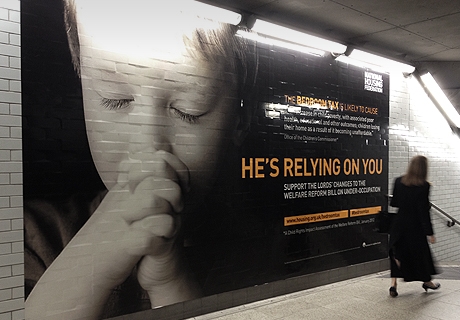Tags
accommodation, Alison Huggan, BBC, bedroom tax, benefit, benefits, Coalition, Coast and Country, Conservative, council, crime, Daily Mail, Daily Telegraph, David Orr, debt, Department for Work and Pensions, DWP, East Ayrshire, Ed Miliband, employed, employment, empty, Fabian, families, family, government, house, housing association, housing benefit, Iain Duncan Smith, Iain Sim, in-work, Margaret Thatcher, Mike Sivier, mikesivier, National Housing Federation, people, politics, poverty, Prime Minister's Questions, property, rent arrears, social security, society, spare room subsidy, tax, Tories, Tory, unemployment, vacant, Vox Political, welfare, working

The real cost of the Bedroom Tax: How many people are going to be thrown out of their homes after losing the arbitrary ‘spare-room subsidy’, that was invented by people like Lord David Freud, who lives in an eight-bedroomed mansion?
A report by the Fabian Society has revealed that the majority of the public wants the government to tackle unemployment, low wages and rising rents, rather than make further spending cuts in housing benefit – just as the National Housing Federation said the consequences of April’s bedroom tax (and other measures) have been worse than feared.
Rent arrears have soared, while larger houses are being left empty because people are refusing to move in and pay the arbitrary “spare room subsidy” that the Coalition government dreamed up last year as an excuse to steal housing benefit money from poor families.
Public feeling on the subject has been manipulated by the right-wing media such as the Daily Telegraph and the Daily Mail, according to the Fabian Society report. It showed that people were initially more convinced by arguments against spending on housing benefit, which costs £23 billion per year.
But this changed when astonished poll participants learned that 93 per cent of the increase in housing benefit claims between 2010-11 came from working people.
The survey found that 63 per cent of people felt poverty was “caused by forces beyond the control of the individual”.
Meanwhile David Orr, chief executive of the National Housing Federation, told the BBC the impact of the tax had been “at least as bad as we had anticipated, in many cases even worse”.
The government’s stated plan – that withdrawing benefit if people are living in a house with a “spare” bedroom, as defined by the Department for Work and Pensions, would encourage them to move to smaller properties – was never going to work as there are 582,000 more families who would need to move than there are suitable properties for them to move into. This is because successive governments have failed to build social accommodation – including the current Coalition.
But Mr Orr said larger homes, vacated by families that had found alternative accommodation, were now going empty because nobody else could afford to move into them.
Of course, this is a disaster for housing associations – the main operators in the social rented sector since Margaret Thatcher started selling council houses in the 1980s; as their homes go empty, they lose money.
“The numbers of empty homes we’ve got to let are increasing significantly,” said Iain Sim, chief executive of Coast and Country Housing, in the BBC website article. “People are now telling us that because of bedroom tax, they can no longer afford to move into the bigger family homes, and as a consequence of that we’re getting fewer lettings and more empty houses.”
You might feel unsympathetic about this – perhaps you think housing associations are part of the problem because they haven’t built smaller accommodation either. But then, they tend to expect to provide homes for families, so this strategy is understandable.
For those who are trapped in larger houses and forced to pay the bedroom tax, rent arrears are on the increase – East Ayrshire Council says its arrears are up by 340 per cent after the tax was introduced.
And those living near newly-empty houses say they expect an increase in crime as a result.
The BBC report also mentions the case of people like Alison Huggan, whose case was mentioned by Ed Miliband in Prime Minister’s Questions in February. The government told her that parents of children in the military who are deployed on operations would be exempt from the bedroom tax – but her local council has imposed it on her because her military sons’ main residences are deemed to be their barracks in Germany and Cyprus.
She said in the report that she felt “cheated, and lied to”.
Considering the situation, the reason for this is clear: She was.
The Department for Work and Pensions is unrepentant but, compared with what is actually happening, the spiel it trotted out for the BBC piece is incredibly ill-advised. A spokesman said the measure was returning fairness to housing: “In England alone there are nearly two million households on the social housing waiting list and over a quarter of a million tenants are living in overcrowded homes”.
… and the bedroom tax means that large homes that could be used to accommodate them are going empty and housing associations are feeling the pinch. How long will it be before they start to collapse?
“This is causing real misery,” Mr Orr told BBC Radio 5 Live.
Well, it would. It seems that was always the intention.
